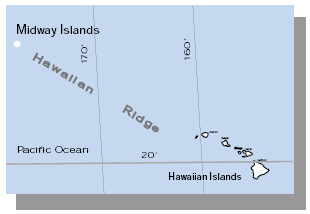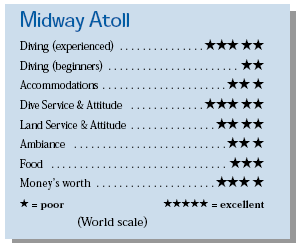Midway Atoll --Three Hours from HawaiiContents of this Issue: Midway Atoll --Three Hours from Hawaii Klein Bonaire Rescued from Developers 105 Equipment Failures Ranked According to Frequency Recommended Cozumel Dive Ops For Advanced Diving Thumbs Down for Riding Rock Inn Editorial Office: Ben Davison Publisher and Editor Undercurrent 3020 Bridgeway, Suite 102 Sausalito, CA 94965 flush with fish but skimpy on coral from the February, 2000 issue of Undercurrent
Dear Fellow Divers: After a run out of the harbor and into the swell, we anchored outside the reef and dropped into the middle of nowhere, halfway between Tokyo and San Francisco. Get caught in a current here, and your next stop is Alaska! The sandy bottom had no outstanding features, and even with 100' visibility, I couldn’t see much in the water with us. Was this what I had come so far for? What’s that in the margins? Looks kind of sharky. Indeed, it is a Galápagos shark coming in for a look-see; and there’s its cousin, heading in too. These were not the aggressive Galápagos sharks described by the few divers who pioneered Midway Atoll ten years ago. Those feisty aggregations had bullied divers back out of their ocean, but these were curious, unhurried, and calm. I saw them on half my dives, often a bonus on otherwise spare safety stops. As I descended farther and began moving makai (seaward),
the hulk of an F4U-1 Corsair deposited here during a training
accident soon materialized. It lay sans engine and tail,
wheels pointing up. Pinkish-yellow fishes with pointed,
white tail fins nervously swam ten feet above the bottom.
Yes! These were the Schlegel’s groupers I’d been told could
be found, flitting about here at 115' instead of at the 500'
these fish normally inhabit off Hawaii’s core islands. I was
seeing beautiful, rare fish seen only by submariners! Approaching
the Corsair, I could make out Japanese, Fisher’s,
banded, and even masked angelfish around the holes left by
dissolved fabric and metal, fish seldom seen, and then
rarely within proximity of one another. Midway Atoll is 1,200 miles westnorthwest of Honolulu, a three-hour trip that a chartered Aloha Airlines Boeing 737-200 ETOPS makes twice weekly. Midway feels like what it is: a semi-abandoned military base, little more than a couple of rusty WWII hangers and a number of cinderblock buildings. A few old concrete buildings left from the transpacific cable days add a spark of historical interest. Nonnative vegetation imported over the years keeps the place from looking barren, but it’s certainly no resort island. The only lodgings are in the remodeled cinderblock Bachelors Officers’ Quarters, which has been updated to clean, comfortable, basic standards. All rooms are air-conditioned and have cable television, telephone, color TVs, and mediocre but decent military furnishings left from the old days. Standard rooms share baths, but you can upgrade to private rooms with private en-suite baths or 2-room suites. The routine is to rise early and breakfast at “the historic Galley,” the old Navy chow hall that will have every veteran reminiscing. The military-style breakfasts were huge, self-serve affairs with a variety of cereals, eggs, pancakes, potatoes, and often curry. After breakfast, ride a bike or golf cart a mile to the complete dive shop by the pier. Sea Angel, Midway Sport Diving’s only boat, awaits. She’s a new, spacious, and uncrowded Pro 48 with triple jet drive, a craft that could easily hold 40, though we never had more than a dozen. Head, warm-water shower, fresh towels, water cooler, soft drinks on ice, and cookies are on board. Aluminum tanks (80s and 72s) were fully topped, and Nitrox 32 was available for those 80-120' dives where it pays off. Photographers will appreciate the two spacious dunk barrels; a multi-tiered camera table is out of the sun, though not out of the way of cookies, towels, and other paraphernalia. A quick run out the channel and you’re on one of the many dive sites. Most have moorings, and I always found them fishy and interesting. The routine is two tanks and back for lunch, which seemed to be an inflexible deadline. They ought to pack lunches for a less-pressured dive trip. We always had longer-than-advertised intervals, but I still felt rushed by the lunch call. Meals in the mess hall were good: military steam table plus with plenty of variety and vegetarian options. The allyou- can-eat, cafeteria-style service offered decent, hearty fare, including a few local hydroponic veggies and fresh fruit flown in from Hawaii. There were lots of curries and Thai, Filipino, and the like for the foreign contract staff. For extra dollars, you can have dinner at the Clipper House, a new, airy, and elegant French restaurant built on the beautiful beach, but they don’t serve lunch and service is spotty, at times becoming glacially slow. The food is imaginatively prepared, although the skimpy portions dressed as “nouvelle cuisine” were insufficient for some hungry divers. I had an excellent fresh fish, a nice salad, and veggies, but those who had the steak complained it was mushy. The only other dinner alternative, the “All Hands Club” snack bar, had lousy fare and service, though the San Miguel beer and margaritas tried to compensate. Most afternoons there’s a one-tank dive, though the schedule can be confusing. Some days, it’s one tank/a.m., two tanks/p.m. Night dives aren’t available, nor are the famous wrecks, since the actual Battle of Midway occurred a couple of hundred miles west and the five aircraft carriers and sundry attendant vessels sunk during the clash now rest three miles down. Aprés dive recreation was limited. The Capt. Brooks beachside tavern is open nightly, although the two nights each week that visitors arrive are by far the busiest. The whole island seemed to turn out to check out new arrivals. It’s the only action here beyond the bounty of birds and wildlife and one beautiful lagoonside beach. Free historic and wildlife tours are scheduled regularly, and I enjoyed walking around, photographing the immense bird populations and savoring the historical aspects of our newest national park. The diving topography is generally similar: dead coral with channels, caverns
and swimthroughs carved by the tides, some sandy areas, and a couple of wrecks. All
this is fabulous for fish life. It’s like diving a huge, dark Swiss cheese, the
holes veritable critter condos. However, conditions varied. Some days were calm,
while others had swells that gave those who could dance La Macarena an edge over
the rest of us dodging the two spacious, broadly runged dive ladders at the stern.
Our dive kahuna was the very competent, observant, but restrained George “Keoki” Stender from Oahu, whose u/w photos are beginning to appear in books and on calendars. He’s managed to attract an experienced dive crew, most with marine biology credentials to boot. They include his wife, Yuko, Japanese dive guide Michiru, Lou, and science teacher Dan, a knowledgeable and affable Santa Claus of a man. They can handle English and Japanese and know the sites intimately despite the April through October dive window. The quality, know-how, continuity, and equipment are extraordinary for a remote seasonal dive operation. Keoki seems to be the glue that holds it together, a committed professional who loves his job. The shop is well supplied with new Scubapro diveware; rentals are available and reliable. Computers are required, with non-computer divers restricted to one dive a day. Dive lengths were of your own choosing with reasonable recreational dive limits imposed, and on most dives two or three dive guides were in the area. With scads of sites to choose from, there’s lots of variety. Severn’s Ledge was a favorite of photo/video types. I dropped to the sandy flat and followed the transpacific cable inshore, staying close to the bottom at 99' to dodge the current. The ledge was another fish magnet full of rarities. I saw a pair of mating day octopi, the male coyly passing his sperm packet to his intended. Phoenix’s Cauldron was a series of deeply-cut channels, overhangs, and caverns with some Galápagos sharks on the entry. Bluefin, thicklipped, giant and black trevally and amberjack abound, and some were bigger than my dive buddy. Sportfishers routinely break size records here, and the big fish aren’t shy with divers. Finning through the carved alleys and back streets, I encountered 3' puppy dog-friendly Hawaiian black groupers. My video shows one from the port side, moving in to a close-up of grouper lips. Bluefin trevally move down the channels, and lobster, Hawaiian morwong, huge spotted and striped knifejaws and myriad angelfish are sprinkled here and there. Yellowtail wrasse juveniles and adults were there, and psychedelic, old woman and bird wrasses were busy hunting. Squirrels and soldierfish, anthias, fantail filefish, and crosshatch triggerfish all swam leisurely around, while fat blackside, stocky, and redbanded hawkfish sat and watched me cruise by. Morays and scorpionfish abound. I got so feverish with the swarms of fish here, I swore I was in someone’s titanic and overstocked aquarium, except they’re bigger here, and they’re practically tame. On my ascent, schools of chub spiraled like grey dust devils with an occasional golden-colored chub as accent. According to no less an authority than Dr. Jack Randall, prolific author of fish books and our companion for a few days, Midway supports more marine endemics than any destination he has visited (that’s about everywhere!), including the Galápagos Islands. Despite the critters, there are no forests of coral, and what’s there is small, some of it no bigger than cauliflowers growing from the dead rock, though there’s still enough to nourish the occasional crown-of-thorns starfish. But the fish are spectacular. This is a pristine piscatorial paradise, and every day there’s a bonus or surprise. One day it was a school of spinner dolphins (200 or so inhabit the lagoon), and on another, two inquisitive and friendly monk seals spotted us from a few hundred feet away and came and played with the divers for the entire dive, entering caverns and even accompanying mind-boggled divers on their safety stops. Midway is on the move, changing from guns to gooneys and groupers. Staff actually listened to recommendations for improvements, and the fish are fabulous. If you’ve been there, done that, and got the tee shirts, and if you don’t mind spending some of your hard-earned lucre to see remote, undived spots with memorable fish spectacles, Midway may be your next destination. |

I want to get all the stories! Tell me how I can become an Undercurrent Online Member and get online access to all the articles of Undercurrent as well as thousands of first hand reports on dive operations world-wide
| Home | Online Members Area | My Account |
Login
|
Join
|
| Travel Index |
Dive Resort & Liveaboard Reviews
|
Featured Reports
|
Recent
Issues
|
Back Issues
|
|
Dive Gear
Index
|
Health/Safety Index
|
Environment & Misc.
Index
|
Seasonal Planner
|
Blogs
|
Free Articles
|
Book Picks
|
News
|
|
Special Offers
|
RSS
|
FAQ
|
About Us
|
Contact Us
|
Links
|
3020 Bridgeway, Ste 102, Sausalito, Ca 94965
All rights reserved.

 Following the wing
to its leading edge, I discovered more corroded holes and
three (Rhinopias) xenops scorpionfish with a decoy
scorpionfish in a metal den peering down at them like an audience of one in a balcony. At the edge
of the starboard wing where the elevators
had fallen and left gaps, I found a stout
moray and a dragon moray so huge that we
gaped at one another. No second thoughts
about the trip out here now!
Following the wing
to its leading edge, I discovered more corroded holes and
three (Rhinopias) xenops scorpionfish with a decoy
scorpionfish in a metal den peering down at them like an audience of one in a balcony. At the edge
of the starboard wing where the elevators
had fallen and left gaps, I found a stout
moray and a dragon moray so huge that we
gaped at one another. No second thoughts
about the trip out here now! We had still waters with more than 130' vis, and we had ripping currents requiring
hand-over-hand work on tag lines to reach the descent point. A couple of dives saw
us fluttering on the ascent lines like carp flags on Japan’s boys’ day! (Since
there are no chase boats to make a downcurrent pickup while other divers are boarding,
Midway is for experienced divers
who aren’t nervous about sharks.) In
terms of varied conditions, my dive on
the wreck of the USS Macaw had it all:
calm and clear at the beginning to swift
and murky when the tide began running
out briskly. A twisted mass of metal at
50' is all that remains of the submarine
tender, which managed to rescue a
grounded sub but stranded itself in the
process. Her twisted hull was a veritable
community for morays of various
species and enormous devil and Titan
scorpionfish. The channel and currents
here mean this wreck and the nearby
water barge hulk, both excellent fish
magnets, don’t get dived regularly. But
when they are, they’re memorable.
We had still waters with more than 130' vis, and we had ripping currents requiring
hand-over-hand work on tag lines to reach the descent point. A couple of dives saw
us fluttering on the ascent lines like carp flags on Japan’s boys’ day! (Since
there are no chase boats to make a downcurrent pickup while other divers are boarding,
Midway is for experienced divers
who aren’t nervous about sharks.) In
terms of varied conditions, my dive on
the wreck of the USS Macaw had it all:
calm and clear at the beginning to swift
and murky when the tide began running
out briskly. A twisted mass of metal at
50' is all that remains of the submarine
tender, which managed to rescue a
grounded sub but stranded itself in the
process. Her twisted hull was a veritable
community for morays of various
species and enormous devil and Titan
scorpionfish. The channel and currents
here mean this wreck and the nearby
water barge hulk, both excellent fish
magnets, don’t get dived regularly. But
when they are, they’re memorable. Diver’s Compass: I traveled with Dive Makai’s knowledgeable Kendra
Choquette on a trip Dive Makai arranged through Midway Phoenix Corp.
and Midway Sport Divers; Dive Makai (phone 808-329-2025; fax 808-
329-2025) has three such trips scheduled next year. Otherwise, book
Midway through Midway Phoenix Corp.: phone 888-BIG-ULUA or 770-254-
8326; fax 770-254-8329; e-mail
Diver’s Compass: I traveled with Dive Makai’s knowledgeable Kendra
Choquette on a trip Dive Makai arranged through Midway Phoenix Corp.
and Midway Sport Divers; Dive Makai (phone 808-329-2025; fax 808-
329-2025) has three such trips scheduled next year. Otherwise, book
Midway through Midway Phoenix Corp.: phone 888-BIG-ULUA or 770-254-
8326; fax 770-254-8329; e-mail 